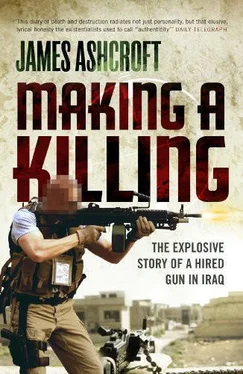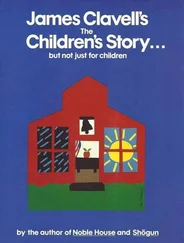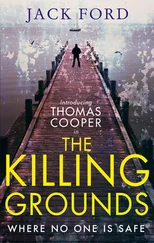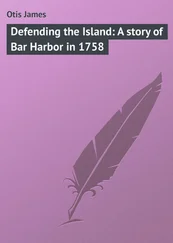We couldn’t move towards the Americans. They would just gun us down without a second thought. I didn’t really want Seamus to suggest heading back down Route Irish and out of the killing area, since there could well have been a cut-off group waiting for us, and there were no concrete blocks there either, just an empty road.
I estimated there were between eight and a dozen rebels in the buildings and an unknown number in the surrounding area. They had almost certainly worked out that we were foreign contractors, even if the Americans hadn’t, and were beginning to lay down more accurate fire. There was at least one gunman at street level, probably the sprinter who had set off the car bomb. His rounds were hitting the concrete wall behind us. I reckoned that with the low standard of marksmanship, at the most we would take one hit, or maybe we’d get lucky and not take a hit at all.
Hendriks and Cobus were pouring fire into the buildings with their RPDs. Not to be outdone, after the initial shock period, a lull of several seconds, the US guard at the near gate opened up with his M249 light machine gun and shot up the row of cars stranded in front of the exit gate. He let off the entire 200-round box in one long burst, shattering windscreens and drilling holes in the vehicles that had survived the car bomb. In a few seconds the front few cars had turned into colanders. I remembered reading that for every 15,000 rounds of ammo the US military fires there is one fatality. This guy was doing his best to lower the average.
Tracer ricocheted into the air and I thought it would be a miracle if none of the civilians out there was hit. The people had either rushed from their vehicles into the buildings or were lying flat on the road with their hands over their heads. It was the rebels who had started the firefight, but the way the US troops had reacted would ensure that the families of the dead would blame the Americans and transfer their sympathies to the fedayeen. The people at home in the US may have believed the War on Terror would wipe out the insurgency but that day in October 2003 I was certain that it was going to get worse. A lot worse. This wasn’t the end of the uprising. It was the beginning.
The soldiers on the near checkpoint were silent again. They must have been reloading. From the far checkpoint there was no fire at all. The soldiers were either dead or had been knocked unconscious from the car explosion. Either way, they remained ineffective throughout the contact.
Cobus and Hendriks were now firing controlled bursts into the windows on the top floor of the buildings. Seamus, from his cover behind the concrete blocks, was waving his mobile about hopelessly trying to get a reception. As was common in the city, especially around the CPA, which we suspected was filled with jamming equipment, our radio comms were down and we had been unable to send a contact report to our HQ.
Les and I, from our better viewpoint, snapped off shots whenever we saw a target. It was impossible to know if we had hit anyone. You think you have made a hit and he goes down, then later a gunman pops up from the same spot. Is it the same one or a new one?
My eyes flicked back and forth over the scene like I was following the erratic movements of a mosquito. The enemy sniper was well hidden, his shots now striking the road about three feet to my left and getting closer. The Americans at the near gate were back into it and were pouring fire into the apartment buildings. The noise was cacophonous, like a continual train crash.
I caught the barest flicker of movement above on the disused flyover 50 metres in front of us. I snapped off two rounds into the parapet.
‘Up on the bridge,’ I yelled over the racket to Les.
Three rebels popped up in baggy camouflage pants and shemaghs . They were young and ragged and could have been any faces in the crowd. They had obviously seen us approach down Route Irish but, hidden behind the parapet, had not known exactly where we had stopped.
The rebel in the centre carried an RPG on his shoulder. It cracked noisily as he released the rocket, but it was badly aimed and fired far too early. He was spooked by my shots, by the intoxication of the moment, and the rocket screamed over us, over the wall behind us, and exploded somewhere in the CPA near the ruined palace. The pounding of the launch and the detonation as it exploded behind us were almost instantaneous.
I trained my front sight on the insurgent on the left of the RPG gunner and squeezed the trigger as he was bringing his weapon to bear.
I gave him a triple tap.
He definitely went down as I saw the blood spray from one head shot; pure luck, I was trying to put all three in his chest.
Then I slotted the guy with the RPG.
At the same time, Les fired three rounds at the insurgent on the right.
As he went down, Les shot the guy with the RPG.
It was instantaneous. Like a drill. I shoot left to right. Les shoots right to left. It was the way we had been trained.
The rebel we had both shot remained standing, which gave me a spark of panic as we pumped rounds into him. It was incredible, these were 7.62mm rounds we were firing and bloody great lumps were coming off the guy but he was still fumbling with a new rocket trying to reload. I was aware that he was not a trained soldier, or he would have first dropped behind cover.
After five rapid rounds from myself and the same from Les, he finally fell.
I had been counting rounds and had got through half a mag.
Civvies often ask if you enjoy killing people. They assume killing someone means wandering along the high street and slaughtering an innocent passer-by with a loving family at home. But it’s not like that. The people I end up killing are always in the act of actively trying to kill me in some murderous, violent and agonising fashion. So, no, I don’t enjoy killing people, but, yes, I feel great afterwards because I feel the initial and immediate exhilaration at realising that I am alive and that the man who tried to kill me has failed.
The other common mistake civvies make is that once they feel they ‘understand’ how I ‘enjoy’ combat, they assume that I must actively seek that thrill again and again. The only reply I have to that is that if a mother and her children are happy when they survive a terrifying car crash, that does not mean that she is going to load her babies into a new car and drive off at high speed looking for the next crash just so that she can re-experience the joy of survival all over again. This is the heart of the misconception people have about security. The purpose of the job is to avoid trouble, not look for it. But no matter how good you are, if trouble finds you, the other part of the job is to ensure that the bad guys don’t try it again.
You may ponder more deeply on the act of taking another man’s life, but if that time comes, it comes later. You may ask yourself what you are doing there on an autumn day in Baghdad, a privately hired contractor licensed to kill by the United States Department of Defense. You may reassure yourself that you are just a PSD doing essential security work in the aftermath of a just war. You are bringing 26 million Iraqis the gift of democracy. All these thoughts run through your mind. You may dig them up later for review. Maybe you’ll just bury them deep as usual and, in the meantime, you’re just a guy having a very bad day at the office.
There was no more action on the flyover above us. Les and I exchanged looks that lasted maybe a fraction of a second and then looked back over our front sights.
As I focused again on the buildings, I realised I was smiling.
Something had been nagging away inside me for the last three weeks: I had been afraid of being left behind. I wasn’t afraid of dying, not more than anyone else; not more than any soldier. I was afraid of falling into the hands of this army of religious zealots and getting my head cut off on TV.
Читать дальше












